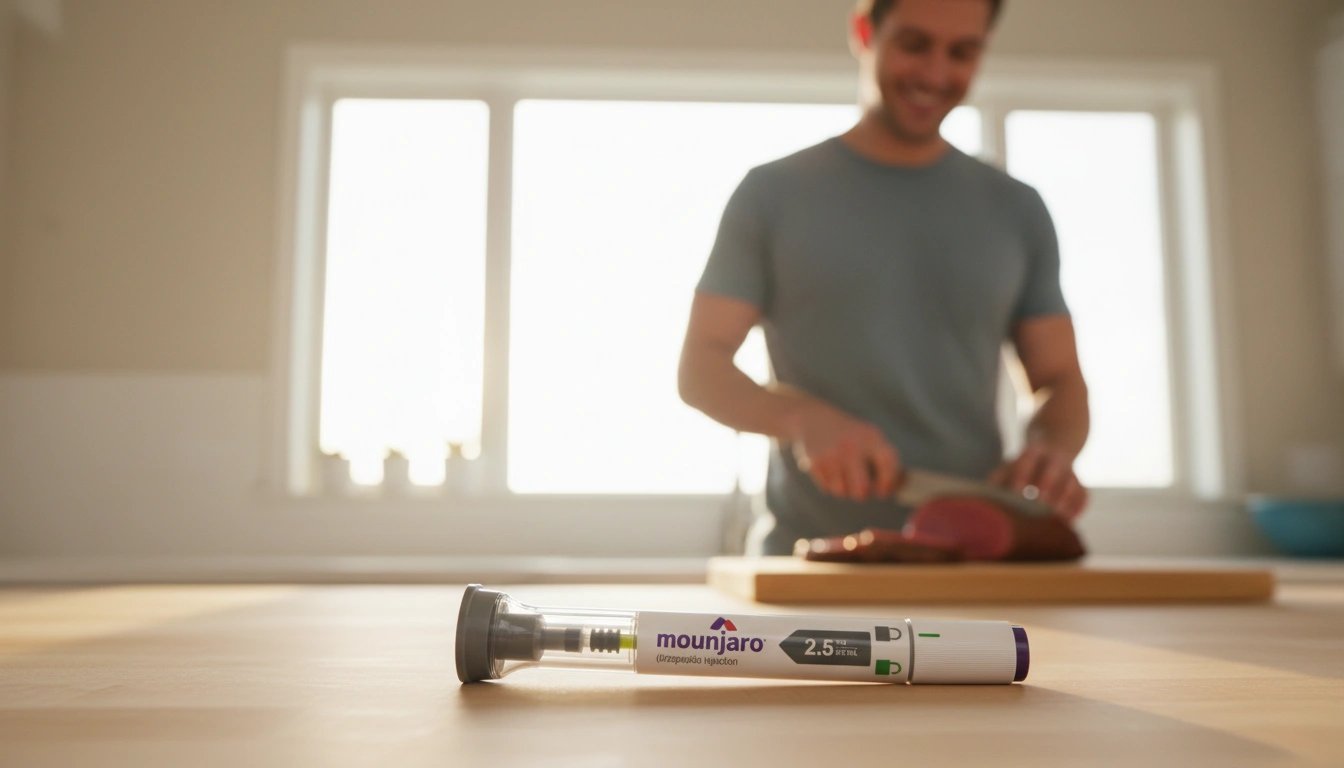Is Gout a Side Effect of Mounjaro? Understanding the Connection

Introduction
As we navigate the complex landscape of weight loss and diabetes management, questions about medication side effects often arise. One such inquiry that has gained traction is, “Is gout a side effect of Mounjaro?” This question is not merely academic; it reflects a significant concern for many individuals managing their health through medication. Gout, a painful form of arthritis characterized by sudden, severe attacks of pain, swelling, and redness in the joints, particularly the big toe, can be debilitating for those affected.
In our blog post today, we will explore the relationship between Mounjaro—an innovative medication for managing type 2 diabetes—and the potential risk of developing gout. We will delve into the mechanisms of Mounjaro, the side effects typically associated with it, and the existing research surrounding its impact on gout. By the end of this post, you will have a clearer understanding of this connection and the steps you can take to manage your health effectively.
Did you know that approximately 4% of adults in the United States are affected by gout? This painful condition can significantly impact one’s quality of life, and its prevalence continues to rise alongside increasing rates of obesity and diabetes. As healthcare professionals and patients alike seek effective treatments for managing type 2 diabetes, medications like Mounjaro (tirzepatide) have emerged as promising options. However, with new treatments come questions regarding potential side effects and their implications for patients.
Mounjaro is a novel medication that mimics hormones in the body to help regulate insulin levels and blood sugar. While it has shown great promise in managing diabetes, it’s essential to understand the potential side effects associated with its use, including the risk of developing gout. The purpose of this blog post is to provide an in-depth examination of whether Mounjaro is linked to gout and what patients should be aware of while using this medication.
Together, we will explore the following topics:
- Understanding Mounjaro: What is it and how does it work?
- Common side effects associated with Mounjaro.
- The relationship between diabetes and gout.
- Current research on Mounjaro and gout.
- Managing the risk of gout while on Mounjaro.
- Conclusion and FAQs.
Let’s dive into the first section and better understand what Mounjaro is and how it works.
Understanding Mounjaro: What is it and How Does it Work?
Mounjaro is a prescription medication specifically designed for adults with type 2 diabetes. It belongs to a class of drugs known as GLP-1 receptor agonists, which work by mimicking the actions of incretin hormones. These hormones are vital for regulating insulin secretion, slowing gastric emptying, and reducing appetite. By enhancing these natural processes, Mounjaro helps manage blood sugar levels more effectively.
Mounjaro is administered as a subcutaneous injection and is typically prescribed as part of a comprehensive diabetes management plan that includes diet and exercise. It is important to note that, like all medications, Mounjaro may have side effects, which we will discuss in the following section.
Common Side Effects Associated with Mounjaro
While Mounjaro is effective for many individuals, it is important to be aware of the potential side effects. Common side effects of Mounjaro include:
- Nausea and Vomiting: Many users experience gastrointestinal discomfort, especially when they first start taking the medication.
- Diarrhea or Constipation: Changes in bowel habits can occur, which may be bothersome for some individuals.
- Decreased Appetite: Mounjaro can lead to a reduced desire to eat, which may be beneficial for weight loss but can also affect nutritional intake.
- Injection Site Reactions: These may include redness, swelling, or itching at the site of injection.
- Abdominal Pain or Discomfort: Some users report feeling bloated or experiencing mild abdominal pain.
- Fatigue: A small percentage of users may experience fatigue or low energy levels.
While these side effects are typically mild and may resolve as the body adjusts to the medication, it is crucial to monitor your health closely and consult with your healthcare provider if any side effects persist or worsen.
Rare but Serious Side Effects
In addition to common side effects, there are also rare but serious side effects associated with Mounjaro. These may include:
- Pancreatitis: Inflammation of the pancreas can occur, leading to severe abdominal pain.
- Gallbladder Issues: Some individuals may experience gallbladder problems, including gallstones.
- Kidney Injury: There is a potential risk of acute kidney injury, particularly in those with pre-existing conditions.
- Allergic Reactions: Though uncommon, allergic reactions can occur and may present as hives, swelling, or difficulty breathing.
Now that we have a clearer understanding of the potential side effects of Mounjaro, let’s explore the connection between diabetes and gout.
The Relationship Between Diabetes and Gout
Understanding the link between diabetes and gout is essential for assessing the potential risks associated with Mounjaro. Gout is often associated with conditions that cause elevated levels of uric acid in the blood, leading to the formation of urate crystals in the joints. Common risk factors for gout include obesity, hypertension, and metabolic syndrome—all of which are prevalent among individuals with type 2 diabetes.
Research indicates that individuals with type 2 diabetes are at a higher risk of developing gout due to the interplay of these risk factors. As such, managing blood sugar levels effectively is crucial, not only for controlling diabetes but also for mitigating the risk of gout.
Gout Attack Triggers
Certain factors can trigger gout attacks, including:
- Diet: High-purine foods, such as red meat, shellfish, and sugary beverages, can elevate uric acid levels.
- Dehydration: Insufficient fluid intake can lead to concentrated uric acid levels.
- Medications: Some medications, including diuretics and certain diabetes treatments, may contribute to increased uric acid levels.
Given that Mounjaro is prescribed to manage blood sugar levels, it is important to understand how it might interact with these risk factors for gout.
Current Research on Mounjaro and Gout
Recent studies have begun to shed light on the potential relationship between Mounjaro and gout. One significant study analyzed data from over 100,000 patients with type 2 diabetes and found that those using GLP-1 agonists, including Mounjaro, may have an increased risk of developing gout. However, it is important to note that this research does not definitively establish a causal relationship; rather, it suggests a correlation that warrants further investigation.
The mechanisms by which Mounjaro might influence uric acid levels are still being explored. It is possible that the medication’s effects on weight loss, appetite regulation, and insulin sensitivity could indirectly impact gout risk.
Implications for Patients
For patients already at risk for gout, the possible association between Mounjaro and gout should be taken into account when considering treatment options. However, it is equally important to recognize that effective management of diabetes through medications like Mounjaro can provide significant benefits that may outweigh the potential risks.
Managing the Risk of Gout While on Mounjaro
If you are considering Mounjaro or are currently using it and are concerned about gout, there are several proactive steps you can take to manage your risk:
- Stay Hydrated: Drink plenty of water to help flush out uric acid from your system.
- Monitor Your Diet: Focus on a balanced diet low in purines. Incorporate more fruits, vegetables, whole grains, and lean proteins.
- Maintain a Healthy Weight: Weight loss can help lower uric acid levels and reduce the risk of gout.
- Limit Alcohol Consumption: Alcohol can contribute to elevated uric acid levels and should be consumed in moderation, if at all.
- Regular Check-ups: Stay in close communication with your healthcare provider to monitor your health and adjust your treatment plan as needed.
Considerations for Personalized Care
At TrimRx, we emphasize the importance of personalized care in weight loss and diabetes management. Our approach combines advanced medical science with empathetic support to help individuals achieve sustainable health outcomes. If you are considering Mounjaro or any other weight loss program, we encourage you to take our free assessment quiz to discover personalized treatment options tailored to your unique needs.
FAQ
In conclusion, while there may be a potential link between Mounjaro and gout, it is crucial to consider the broader context of diabetes management and the individual risk factors associated with gout. By being proactive in your healthcare and making informed choices, you can effectively manage your diabetes while minimizing the risk of gout.
FAQ
Can Mounjaro cause gout?
While some studies suggest a potential connection between GLP-1 agonists like Mounjaro and an increased risk of gout, more research is needed to establish a definitive causal relationship.
What should I do if I experience gout symptoms while on Mounjaro?
If you experience symptoms of gout, such as sudden joint pain, swelling, or redness, it is essential to seek medical advice promptly. Your healthcare provider can assess your symptoms and suggest appropriate management strategies.
How can I lower my risk of gout while using Mounjaro?
Staying hydrated, monitoring your diet, maintaining a healthy weight, and regular check-ups with your healthcare provider can help manage your risk of gout.
Is it safe to use Mounjaro if I have a history of gout?
If you have a history of gout, it is important to discuss this with your healthcare provider before starting Mounjaro. They can help assess the potential risks and benefits based on your individual health profile.
Where can I learn more about Mounjaro and its effects?
For more information about Mounjaro, its uses, and potential side effects, consult your healthcare provider or visit reputable medical resources online.
By staying informed and working closely with your healthcare team, you can navigate your diabetes management effectively, ensuring your health remains a top priority. If you’re interested in exploring personalized weight loss solutions, consider checking out our GLP-1 Daily Support and Weight Loss Boost supplements designed to support you on your journey. Together, we can embrace a healthier lifestyle.

Transforming Lives, One Step at a Time
Keep reading
What Happens If You Stop Taking Mounjaro?
If you stop taking Mounjaro, your appetite will return to its pre-medication baseline within a few weeks, and most people regain a substantial portion…
Mounjaro Maintenance Dose: What Works Long-Term
Your Mounjaro maintenance dose is the dosage you stay on after reaching your weight loss goal, and it’s not always the same dose you…
How Long Can You Take Mounjaro?
You can take Mounjaro for as long as it continues to be effective, well-tolerated, and medically appropriate. There is no established maximum treatment duration….



